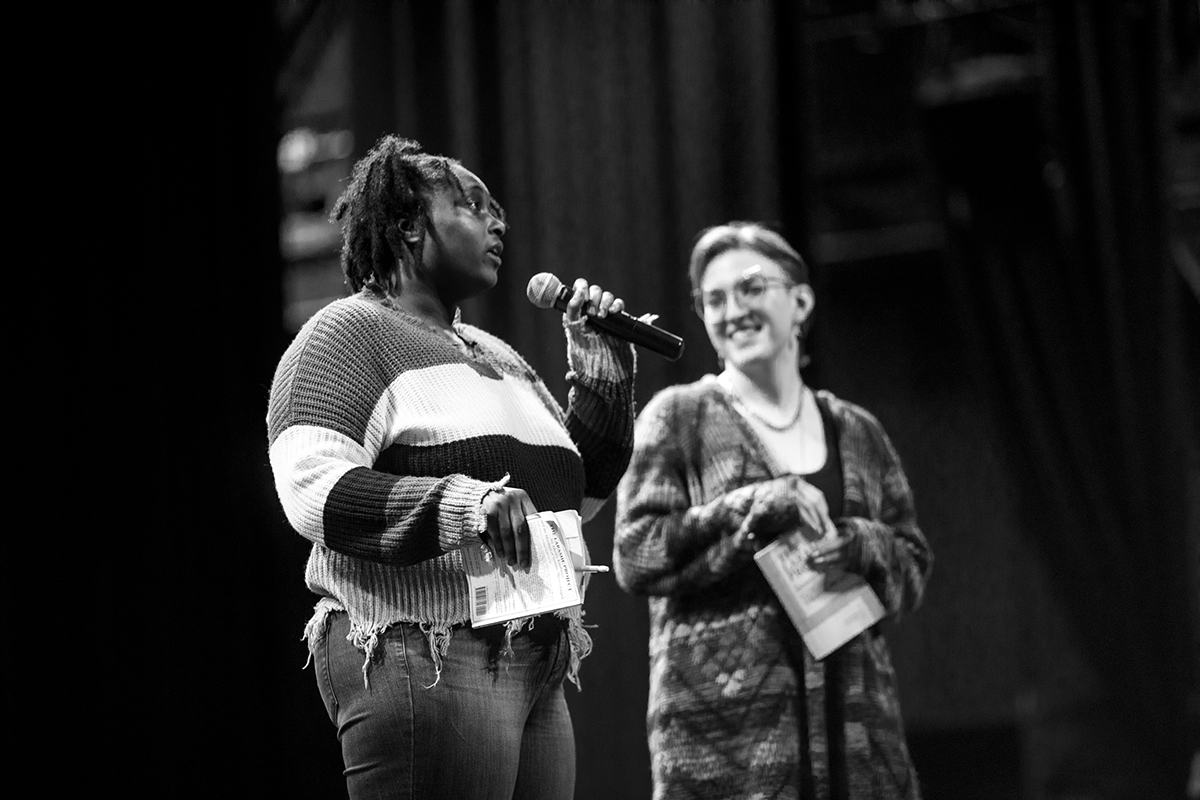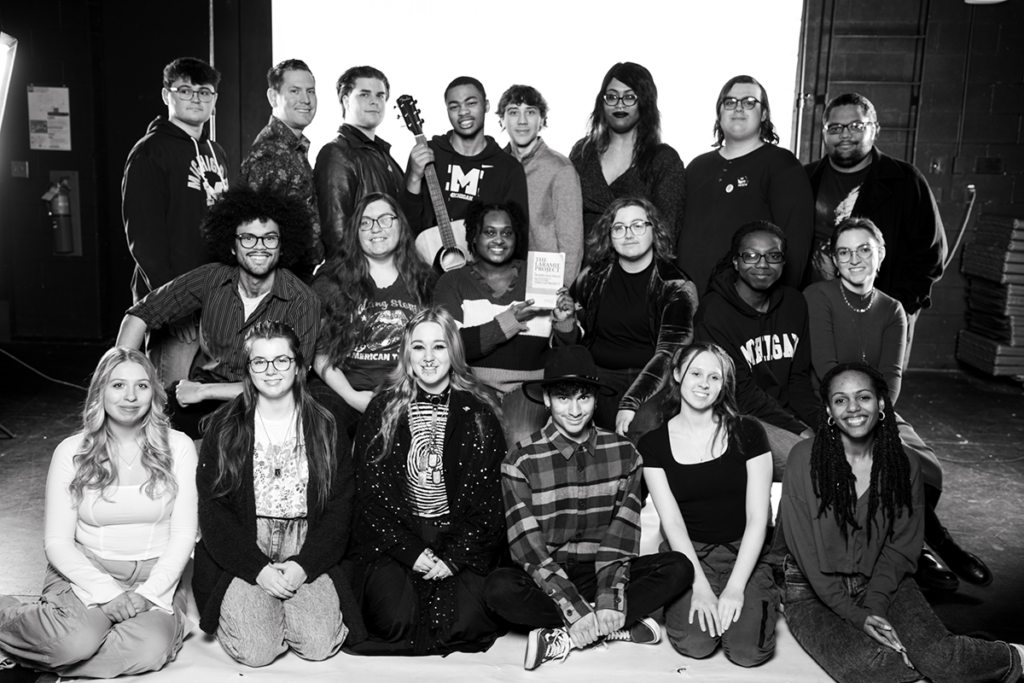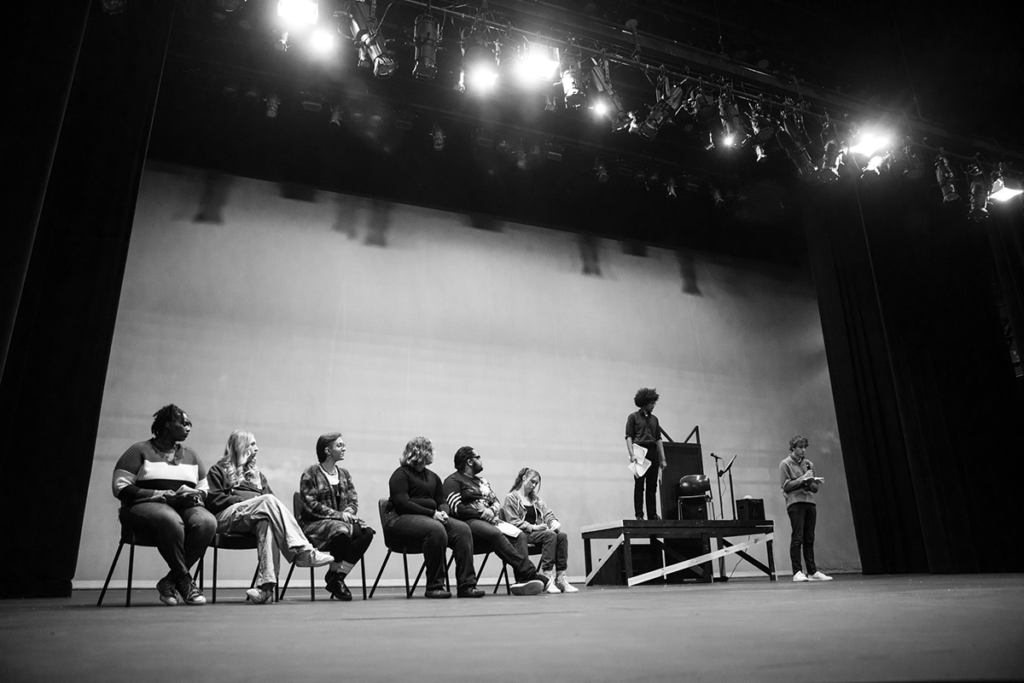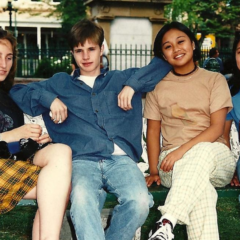UM-Flint's 'The Laramie Project' examines a community's healing response to tragedy

The night of Oct. 6, 1998, changed the town of Laramie, Wyoming, forever. The brutal murder of Matthew Shepard put that small city in the national spotlight and inspired in its residents complex reactions to the crime.
Moisés Kaufman and members of the Tectonic Theater Project sought to illuminate those experiences by conducting hundreds of interviews with Laramie's residents. Combining those perspectives with the theatre company's reflective journal entries and published news reports, "The Laramie Project" is a documentary-style stage performance that tells the perspectives of more than 60 characters, most of whom are real Laramie residents.
"I selected 'The Laramie Project' this season for several reasons. First, the way it's structured creates a student-centric engagement with the performing arts and enables a large number of our students, regardless of their academic major, to collaborate as either actors, technicians or designers," said Janet Haley, associate professor of theatre at the University of Michigan-Flint and the production's director. "The script has been at the center of a year-long creative collaboration between the theatre program and the university's Center for Gender and Sexuality, with a series of events throughout the year that have inspired the mainstage production."
Classified as verbatim theatre, "Laramie" is composed of the words of real people and captures the community's response to an event with historical and political significance. Each of the company's 16 actors plays multiple roles and the fact that these roles reflect real people stood out to the students.
"Something that makes Laramie unique compared to any other play I have ever done is that these are real people's words and stories," said Icarus Jones, a junior theatre major minoring in anthropology from Flint. "All of the words that we speak in this play are the exact words that were spoken."
For Michaela Floyd, a sophomore theatre major from Saginaw, the experience of embodying various people gave them a broad perspective of what the different community members felt in the aftermath of Shepard's death.
"In one of my roles, I get to play a juror, which allows me to feel more connected to the case. With all of my other roles, I just feel bad for Matthew," said Floyd. "But being a juror allows me to feel I control what happens to these people. There is an aspect of hope when I play that juror because I get to have a say in what happens to the people that did this."

Throughout the play, the interviews explore themes of homophobia, the definition of a hate crime, Western values, class, violence and whether this single act of hatred should define the small town of Laramie. For many cast members, this inevitably brought up comparisons to Flint.
"I have a line at the beginning of the show that talks about how Laramie is defined by what happened to Matthew Shepard. It is interesting how it kind of rides the same line as Flint's community and how the water crisis defines Flint," said Logan Reeves, a senior theatre major from Fenton. "Flint is so much more than the water crisis, and this piece shows that Laramie is so much more than what happened there."
While the development process for the production may differ from other performances at UM-Flint, the theatre program's standard practice of holding open auditions means that the cast of "Laramie" comprises students from across the campus.
"You don't have to be a theatre major to be a part of a production like this," said Greyson Watson, a junior psychology major from Fenton. "We live in a state of uncertainty at the moment, and I think it is so important to give space for this in places where it can be effectively received."
Gianna Mask, a junior interdisciplinary studies major from Grand Blanc, echoes Watson's sentiment.
"Being part of 'Laramie' reflects UM-Flint's commitment to community, arts and inclusion," Mask said. "This production shows that people can come together and create beautiful pieces regardless of their educational passion. This production is exceptionally important for UM-Flint because the arts show that many different people can be connected in one beautiful way."
According to Haley, the eclectic group of actors, technicians and designers have collaborated to create a truly unique theatre experience.
"We have passionately created as a collective of learners, artists and citizens for the community, with some elements quite literally 'outside of the box' — some action occurs in the theatre lobby and on the mainstage. It is a multimedia production and employs original projection design, acoustic and vocal music, digital sound, and creative movement," she said.

Since its premiere in 2000, "Laramie" has been produced worldwide. It presents a nuanced portrait of a community forced to confront its values and prejudices. For the cast, "Laramie" offers insight into how any community can heal from tragedy.
"This play has such an important message and is so educational about a very tragic event that actually happened. So in this play, we are not only performing for the audience, we are trying to educate them," said Abigail Speck, a first-year English teacher certification program major minoring in theatre from Grand Blanc. "I hope that people take away that things like this still happen. I hope that people learn to look out for other people. This show has a lot of hate, and I hope that people learn that it is so much easier to love than hate."
"Historically, as progress is made towards advancing rights for underrepresented groups, we tend to distance ourselves from it and say that it was so long ago," said Logan Keir, a senior English/pre-law major minoring in criminal justice from South Lyon. "I hope that people take away that this was recent. We are not a world that is past phobias toward minority groups."
"I hope people just listen," said Zion Cheff, a junior theatre major from Grand Blanc. "I think something that audiences can take away from this production is to be compassionate and caring for others, even if you do not agree with them."
UM-Flint's "The Laramie Project" runs April 17-19, with performances starting at 7:30 p.m. For information and tickets, please visit thefim.org/event/laramieproject.
Kate Lawrence contributed to this story.
Kat Oak
Kat Oak is the communications specialist for the College of Arts, Sciences, and Education. She can be reached via email at katheroa@umich.edu.

